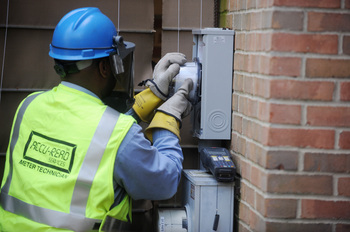DTE Energy customers shouldn’t have to pay $87 to have a smart meter taken off their home, Michigan Attorney General Bill Schuette says.
Customers should also be able to keep their analog meter, Schuette said in a written opinion.
In the statement filed this month by Schuette in response to ongoing state-level hearings on Detroit Edison's proposed opt-out program for its customers who don’t want smart meters, Schuette said he didn’t think fees the company had proposed customers pay were justified.

A worker installs a smart meter at an area residence. DTE Energy is in the process of developing an opt-out program for customers who don't want the device, at the request of the state.
Melanie Maxwell I AnnArbor.com file photo
Smart meters are digital devices that track energy usage. DTE is using them in place of older analog meters. The new devices are equipped with radio transmitters to wirelessly communicate electricity consumption information to the company, allowing Detroit Edison to remotely monitor power outages and usage.
A number of Ann Arbor residents have been vocal as smart meters have been installed and during the state hearings, and have submitted pages of personal testimony to the commission on adverse health effects they report have come from the installation of smart meters in their neighborhoods and throughout the community.
However, much of the submitted testimony was stricken from the record of the hearing in January because the administrative law judge hearing the case, Judge Dennis Mack, did not deem it to be relevant to the issue of whether customers should have to pay to opt out of the smart meter program.
Cynthia Edwards, 59, an Ann Arbor resident, says she’s sensitive to the electromagnetic waves that smart meters and other devices emit and submitted some of her personal testimony to the hearing. Mack removed the testimony from the record.
Edwards said even though her testimony is no longer on the official record, it was heard by each of the members of the Public Service Commission during the initial proceedings.
“We’re really glad that (Schuette) gets at least one aspect of it,” Edwards said in reaction to Schuette’s opinion.
However, Edwards said she’s not confident that the Michigan Public Service Commission will heed his advice.
DTE Energy developed an opt-out plan for smart meters in July at the request of the commission. The plan called for customers to pay an initial $87 charge if they did not want a smart meter on their homes, and then to pay an additional $15.60 per month to have a DTE Energy technician come to the home and read the meter.
Under its proposed opt-out program, DTE Energy would not remove the digital meter from the customer’s home, and instead would turn off the radio transmitting portion of the device.
Attorney General Schuette said in his opinion that the fees DTE Energy was proposing were not justified.
A cost schedule DTE Energy submitted during the hearing stated labor and overhead costs average about $61.46 per hour. It included additional fees for training and billing. At the minimum, Schuette stated the commission should reduce the initial charge for opt-out customers to $67.20 from the proposed $87.
For each customer every month, DTE claimed during the hearing it would cost $8 to read a meter, $2 for a supervisor, $3.60 for two billing analysts and $2 for a route coordinator. DTE bills its customers now a meter-reading rate of $0.45 per month.
Schuette recommended that the commission reduce the proposed new monthly charge for having a technician visit a residence to read the meter from $15.60 to $9.80.
Both the new digital meters and old analog meters have the same life span of 20 years, according to Schuette’s statement.
“There is no need to replace an analog meter to obtain the individual read,” according to a written excerpt from Schuette’s opinion. Since continuing to use an analog meter will provide the same information as a radio-disabled AMI meter, there is no preponderance of the evidence to justify a ruling by the Commission that opt-out customers should be required to accept a radio-disabled AMI meter. And requiring opt-out customers to accept a radio disabled AMI meter would unnecessarily increase rate base and base rates. all other things being equal.”
Turning off a digital transmitter takes approximately 45 minutes, and exchanging one meter for the other takes approximately five minutes, according to evidence submitted by DTE Energy during the hearing.
Reply opinions to the Michigan Public Service Commission regarding the hearing are due by Tuesday, said Judy Palnau, spokeswoman for the commission.
Judge Mack is scheduled to issue his decision March 29, Palnau said.
After the judge hands down his decision, the commission will review it and issue its final order to DTE Energy. The date of the commission’s final order has yet to be determined, Palnau said.
Amy Biolchini covers Washtenaw County, health and environmental issues for AnnArbor.com. Reach her at (734) 623-2552, amybiolchini@annarbor.com or on Twitter.